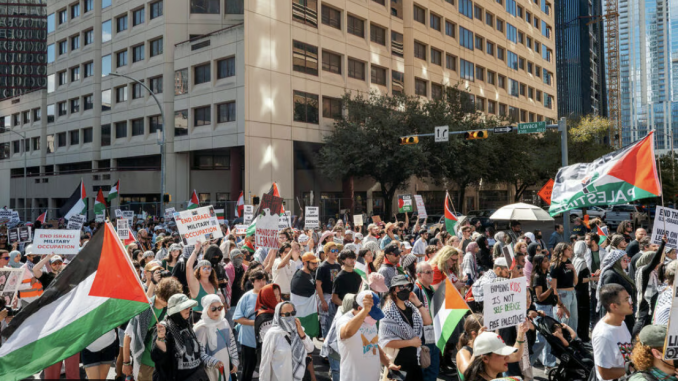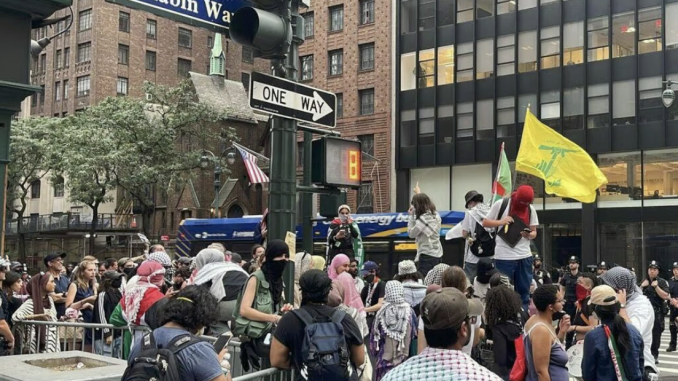Analysis: Since October 7, global antisemitism has surged, with sharp increases in vandalism, threats and assaults against Jewish communities; countries like Germany, Argentina and South Africa have seen significant spikes
Brigadier General (ret.) Amir Avivi |
 Pro-Palestinian rally in Austin, Texas (Photo: Brandon Bell/Getty Images)
Pro-Palestinian rally in Austin, Texas (Photo: Brandon Bell/Getty Images)
Global antisemitism has spiked since October 7 amid Israel-Hezbollah tensions, raising concerns for Jewish communities. There has been a notable rise in acts of vandalism, threats and assaults against Jewish communities, synagogues and community centers in many countries across the world.
Since October 7, antisemitism in South Africa, mostly in the form of online rhetoric, has risen a massive 600%. Concerning increases have also been evident in countries with large Jewish populations, such as Argentina and Brazil.
There are also concerns for Jewish communities in Europe, where 10% of the global Jewish population lives. “Jewish life in Germany is under greater threat than it has ever been since the Federal Republic of Germany came into existence,” said Felix Klein, a federal commissioner tasked with fighting antisemitism in Germany.
More than 70% of the antisemitic incidents recorded in Germany after October 7 were “Israel-related.” Recorded incidents in Germany have included seven cases defined as life-threatening, including an attack on a Berlin synagogue with Molotov cocktails in October that shocked much of the city’s Jewish community.
One element of these global campaigns stems from Iran’s funding of Hamas and Hezbollah who target Israel and Jewish communities worldwide, seeking to destabilize global security in the process. In a short time, Hezbollah has become far more mobilized, becoming a transcontinental organization with a presence in Europe, Africa and East Asia. This presence allows them to recruit not just individuals driven by antisemitism, but also those who may already harbor anti-Western or anti-Israel sentiments who are more susceptible to radicalization.
 Anti-Israel protesters wave Hezbollah flag outside entrance to Israeli consulate in New York ( Photo: from X)
Anti-Israel protesters wave Hezbollah flag outside entrance to Israeli consulate in New York ( Photo: from X)
In recent months, symbols of these terrorist organizations, such as Hamas and Hezbollah flags, have been on show at countless protests and demonstrations without consequence. Protest calls to “globalize the intifada” or for the destruction of Israel should face urgent legal action and penalties. The issue extends to universities, where antisemitism is a growing problem now throughout Europe and the U.S. More academic and legal accountability is essential to counter this.
Another factor in the spread of antisemitism are broader-based supposedly liberal and progressive movements in the West, which often support Palestinian statehood while simultaneously opposing Israel’s existence, revealing an obvious hypocrisy in their selective endorsement of self-determination.
Clearly, Palestinian autonomy cannot be advocated whilst denying the Jewish people the right to their homeland. Zionism continues to be our movement for justice, equality and Jewish self-determination in the form of the State of Israel.
This fight transcends Jewish concerns however—it is a global struggle against hatred, extremism and misinformation. To reverse this tide therefore, a strategic, multi-pronged approach is needed—one that blends positive advocacy for Zionism with targeted measures against antisemitic forces. Promoting a proactive and positive vision of Zionism, taking strong legal and economic actions against antisemitic, terror-affiliated or terror-motivated movements, and ensuring broad societal engagement are all vital components moving forward.
Governments play a crucial role in providing support for large-scale advocacy, education, and mobilization efforts in reversing these recent trends. Robust resources for educational initiatives, conferences, and international delegations are needed to shift global perceptions and drive lasting change.
Building a broad coalition is essential and action must be taken across all sectors of society and the Jewish world. Zionist activism must extend beyond traditional Jewish advocacy groups, to form partnerships with other communities and organizations fighting hatred and extremism.
Brigadier General (res.) Amir Avivi is the founder and chairman of the Israel Defense And Security Forum (IDSF).



Leave a Reply
You must be logged in to post a comment.